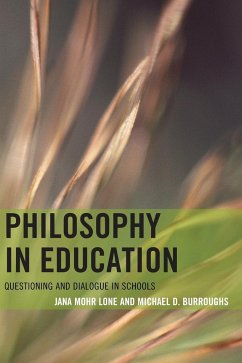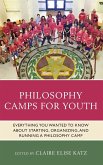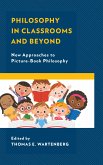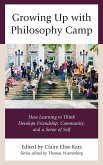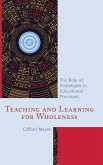- Gebundenes Buch
- Merkliste
- Auf die Merkliste
- Bewerten Bewerten
- Teilen
- Produkt teilen
- Produkterinnerung
- Produkterinnerung
Philosophy in Education: Questioning and Dialog in K-12 Classrooms is a textbook in the fields of pre-college philosophy and philosophy of education, intended for philosophers and philosophy students, K-12 classroom teachers, administrators and educators, policymakers, and pre-college practitioners of all kinds.
Andere Kunden interessierten sich auch für
![Philosophy Camps for Youth Philosophy Camps for Youth]() Philosophy Camps for Youth96,99 €
Philosophy Camps for Youth96,99 €![Philosophy in Classrooms and Beyond Philosophy in Classrooms and Beyond]() Philosophy in Classrooms and Beyond73,99 €
Philosophy in Classrooms and Beyond73,99 €![What Schools Can Be What Schools Can Be]() Rick AckerlyWhat Schools Can Be97,99 €
Rick AckerlyWhat Schools Can Be97,99 €![Growing Up with Philosophy Camp Growing Up with Philosophy Camp]() Growing Up with Philosophy Camp82,99 €
Growing Up with Philosophy Camp82,99 €![Teaching and Learning for Wholeness Teaching and Learning for Wholeness]() Clifford MayesTeaching and Learning for Wholeness81,99 €
Clifford MayesTeaching and Learning for Wholeness81,99 €![Self-Efficacy in Action Self-Efficacy in Action]() Self-Efficacy in Action68,99 €
Self-Efficacy in Action68,99 €![Invitational Education and Practice in Higher Education Invitational Education and Practice in Higher Education]() Invitational Education and Practice in Higher Education172,99 €
Invitational Education and Practice in Higher Education172,99 €-
-
-
Philosophy in Education: Questioning and Dialog in K-12 Classrooms is a textbook in the fields of pre-college philosophy and philosophy of education, intended for philosophers and philosophy students, K-12 classroom teachers, administrators and educators, policymakers, and pre-college practitioners of all kinds.
Hinweis: Dieser Artikel kann nur an eine deutsche Lieferadresse ausgeliefert werden.
Hinweis: Dieser Artikel kann nur an eine deutsche Lieferadresse ausgeliefert werden.
Produktdetails
- Produktdetails
- Verlag: Globe Pequot Publishing Group Inc/Bloomsbury
- Seitenzahl: 256
- Erscheinungstermin: 22. Februar 2016
- Englisch
- Abmessung: 260mm x 183mm x 18mm
- Gewicht: 683g
- ISBN-13: 9781442234772
- ISBN-10: 1442234776
- Artikelnr.: 43205894
- Herstellerkennzeichnung
- Books on Demand GmbH
- In de Tarpen 42
- 22848 Norderstedt
- info@bod.de
- 040 53433511
- Verlag: Globe Pequot Publishing Group Inc/Bloomsbury
- Seitenzahl: 256
- Erscheinungstermin: 22. Februar 2016
- Englisch
- Abmessung: 260mm x 183mm x 18mm
- Gewicht: 683g
- ISBN-13: 9781442234772
- ISBN-10: 1442234776
- Artikelnr.: 43205894
- Herstellerkennzeichnung
- Books on Demand GmbH
- In de Tarpen 42
- 22848 Norderstedt
- info@bod.de
- 040 53433511
Jana Mohr Lone is the founder and director of the University of Washington Center for Philosophy for Children. Since 1995 she has taught philosophy in classrooms from preschool to college, as well as taught college students, K-12 teachers, parents and others about ways to bring philosophy into the lives of young people. She is the author of The Philosophical Child, which explores ways that parents, grandparents, and other adults can stimulate philosophical conversations about children's questions, Philosophy and Education: Introducing Philosophy to Young People, (co-editor with Roberta Israeloff), which examines various issues involved in teaching philosophy to young people, and many articles about K-12 philosophy. She writes the blog Wondering Aloud: Philosophy with Young People. A frequent speaker about pre-college philosophy, Jana is the president of PLATO (Philosophy Learning and Teaching Organization), chair of the American Philosophical Association Committee on Pre-College Instruction in Philosophy, and the founding editor-in-chief of the journal Questions: Philosophy for Young People. Michael D. Burroughs is Assistant Director of the Rock Ethics Institute and Senior Lecturer in Philosophy at the Pennsylvania State University. For over a decade, he has been working to provide greater access to pre-college philosophy in the United States. Michael has taught philosophy at numerous academic levels, including K-12 and college classes, as well as workshops for pre-college teachers and university professors. In 2008, Michael co-founded Philosophical Horizons, a pre-college philosophy program dedicated to introducing the history and practice of philosophy to children in Memphis city schools (K-12). Michael also served as Outreach Coordinator for the Philosophy Department at the University of North Carolina at Chapel Hill. During his tenure at UNC-Chapel Hill, he taught university courses on pre-college philosophy and collaborated with local educators and philosophy and education graduate students to begin numerous elementary, middle, and high school philosophy programs. Michael serves on the PLATO (Philosophy Learning and Teaching Organization) board of directors and has presented and written extensively on issues in pre-college philosophy, including chapters in Philosophy in Schools: An Introduction for Philosophers and Teachers (Routledge, 2013) and Ethics in Youth Sport: Policy and Pedagogical Applications (Routledge, 2013).
Preface Section IWhy introduce philosophy to young people? Chapter 1 -
Philosophy Beyond the University Chapter 2 - Wonder, Questioning and
Reflection Section IIMaking Space for Questioning and Dialogue Chapter 3 -
Learner-Centered Education and the Dialogical Model Chapter 4 -
Philosophical Sensitivity Chapter 5 - The Community of Philosophical
Inquiry Section IIIIn the Classroom Chapter 6 - Philosophy in Elementary
School A Question Board Creating Our Own Philosophical Story The Three
Questions by Jon Muth Stuart Little chapter 12 by E.B. White Big Questions
and How We Answer Them Why? by Lindsay Camp and Tony Ross Keep the Question
Going What's Your Reason? Good News, Bad News Horton Hears A Who by Dr.
Seuss Harry Potter and the Sorcerer's Stone chapter 12 by J.K. Rowling
Silent discussion: The Hole by Øyvind Torseter Let's Do Nothing by Tony
Fucile The Big Orange Splot by Daniel Manus Pinkwater An Angel for Solomon
Singer by Cynthia Rylant A Shelter in Our Car by Monica Gunning Four Feet,
Two Sandals by Karen Lynn Williams and Khadra Mohammed Amazing Grace by
Mary Hoffman Paperbag Princess by Robert Munsch The Other Side by
Jacqueline Woodson Freedom Summer by Deborah Wiles Bird by Zetta Elliott
The Conductor by Laetitia Devernay What is Music? Silence and Sound The Art
Lesson by Tomie de Paola What is art? The Coat by Julie Hunt and Ron Brooks
Chapter 7 - Philosophy in Middle School Freedom Fair or Equal? Justice and
Fairness in Schools Stereotyping Following the Leader On Friendship Human
Nature and the Ring of Gyges Drawing a Good Life Shallow Pond and Charity
Philosophical Inquiry and Teaching The Book Thief by Marcus Zusak LEGOs of
Theseus Social Media and Free Will Convince Your Teacher/Principal Logic
Charades Chapter 8 - Philosophy in High School Arguments and Philosophical
Reasoning Drop the Ball What Do We Find Beautiful? Affirmative Action in
University Admissions (1) Affirmative Action in University Admissions (2) I
Lost My Cool Social Contract Theory: Creating a Cooperative Learning
Environment Applied Ethics - Genetic Enhancement Justice and Utopia The
Case of Kitty Genovese: Moral Responsibility and the Bystander Effect The
Words We Live By The Ethics of "Stop Snitching" Socratic Seminar In-Class
Ethics Bowl Section IVIdentity, Social Inequality and Philosophical
Practice Chapter 9 - Philosophical Recognition and Identity: Recognizing
the Child Chapter 10 - Children's Philosophical Encounters: Taking
Seriously the Role of Privilege in Classrooms Chapter 11 - Philosophy and
Transforming K-12 Education Appendix Bibliography About the Authors
Philosophy Beyond the University Chapter 2 - Wonder, Questioning and
Reflection Section IIMaking Space for Questioning and Dialogue Chapter 3 -
Learner-Centered Education and the Dialogical Model Chapter 4 -
Philosophical Sensitivity Chapter 5 - The Community of Philosophical
Inquiry Section IIIIn the Classroom Chapter 6 - Philosophy in Elementary
School A Question Board Creating Our Own Philosophical Story The Three
Questions by Jon Muth Stuart Little chapter 12 by E.B. White Big Questions
and How We Answer Them Why? by Lindsay Camp and Tony Ross Keep the Question
Going What's Your Reason? Good News, Bad News Horton Hears A Who by Dr.
Seuss Harry Potter and the Sorcerer's Stone chapter 12 by J.K. Rowling
Silent discussion: The Hole by Øyvind Torseter Let's Do Nothing by Tony
Fucile The Big Orange Splot by Daniel Manus Pinkwater An Angel for Solomon
Singer by Cynthia Rylant A Shelter in Our Car by Monica Gunning Four Feet,
Two Sandals by Karen Lynn Williams and Khadra Mohammed Amazing Grace by
Mary Hoffman Paperbag Princess by Robert Munsch The Other Side by
Jacqueline Woodson Freedom Summer by Deborah Wiles Bird by Zetta Elliott
The Conductor by Laetitia Devernay What is Music? Silence and Sound The Art
Lesson by Tomie de Paola What is art? The Coat by Julie Hunt and Ron Brooks
Chapter 7 - Philosophy in Middle School Freedom Fair or Equal? Justice and
Fairness in Schools Stereotyping Following the Leader On Friendship Human
Nature and the Ring of Gyges Drawing a Good Life Shallow Pond and Charity
Philosophical Inquiry and Teaching The Book Thief by Marcus Zusak LEGOs of
Theseus Social Media and Free Will Convince Your Teacher/Principal Logic
Charades Chapter 8 - Philosophy in High School Arguments and Philosophical
Reasoning Drop the Ball What Do We Find Beautiful? Affirmative Action in
University Admissions (1) Affirmative Action in University Admissions (2) I
Lost My Cool Social Contract Theory: Creating a Cooperative Learning
Environment Applied Ethics - Genetic Enhancement Justice and Utopia The
Case of Kitty Genovese: Moral Responsibility and the Bystander Effect The
Words We Live By The Ethics of "Stop Snitching" Socratic Seminar In-Class
Ethics Bowl Section IVIdentity, Social Inequality and Philosophical
Practice Chapter 9 - Philosophical Recognition and Identity: Recognizing
the Child Chapter 10 - Children's Philosophical Encounters: Taking
Seriously the Role of Privilege in Classrooms Chapter 11 - Philosophy and
Transforming K-12 Education Appendix Bibliography About the Authors
Preface Section IWhy introduce philosophy to young people? Chapter 1 -
Philosophy Beyond the University Chapter 2 - Wonder, Questioning and
Reflection Section IIMaking Space for Questioning and Dialogue Chapter 3 -
Learner-Centered Education and the Dialogical Model Chapter 4 -
Philosophical Sensitivity Chapter 5 - The Community of Philosophical
Inquiry Section IIIIn the Classroom Chapter 6 - Philosophy in Elementary
School A Question Board Creating Our Own Philosophical Story The Three
Questions by Jon Muth Stuart Little chapter 12 by E.B. White Big Questions
and How We Answer Them Why? by Lindsay Camp and Tony Ross Keep the Question
Going What's Your Reason? Good News, Bad News Horton Hears A Who by Dr.
Seuss Harry Potter and the Sorcerer's Stone chapter 12 by J.K. Rowling
Silent discussion: The Hole by Øyvind Torseter Let's Do Nothing by Tony
Fucile The Big Orange Splot by Daniel Manus Pinkwater An Angel for Solomon
Singer by Cynthia Rylant A Shelter in Our Car by Monica Gunning Four Feet,
Two Sandals by Karen Lynn Williams and Khadra Mohammed Amazing Grace by
Mary Hoffman Paperbag Princess by Robert Munsch The Other Side by
Jacqueline Woodson Freedom Summer by Deborah Wiles Bird by Zetta Elliott
The Conductor by Laetitia Devernay What is Music? Silence and Sound The Art
Lesson by Tomie de Paola What is art? The Coat by Julie Hunt and Ron Brooks
Chapter 7 - Philosophy in Middle School Freedom Fair or Equal? Justice and
Fairness in Schools Stereotyping Following the Leader On Friendship Human
Nature and the Ring of Gyges Drawing a Good Life Shallow Pond and Charity
Philosophical Inquiry and Teaching The Book Thief by Marcus Zusak LEGOs of
Theseus Social Media and Free Will Convince Your Teacher/Principal Logic
Charades Chapter 8 - Philosophy in High School Arguments and Philosophical
Reasoning Drop the Ball What Do We Find Beautiful? Affirmative Action in
University Admissions (1) Affirmative Action in University Admissions (2) I
Lost My Cool Social Contract Theory: Creating a Cooperative Learning
Environment Applied Ethics - Genetic Enhancement Justice and Utopia The
Case of Kitty Genovese: Moral Responsibility and the Bystander Effect The
Words We Live By The Ethics of "Stop Snitching" Socratic Seminar In-Class
Ethics Bowl Section IVIdentity, Social Inequality and Philosophical
Practice Chapter 9 - Philosophical Recognition and Identity: Recognizing
the Child Chapter 10 - Children's Philosophical Encounters: Taking
Seriously the Role of Privilege in Classrooms Chapter 11 - Philosophy and
Transforming K-12 Education Appendix Bibliography About the Authors
Philosophy Beyond the University Chapter 2 - Wonder, Questioning and
Reflection Section IIMaking Space for Questioning and Dialogue Chapter 3 -
Learner-Centered Education and the Dialogical Model Chapter 4 -
Philosophical Sensitivity Chapter 5 - The Community of Philosophical
Inquiry Section IIIIn the Classroom Chapter 6 - Philosophy in Elementary
School A Question Board Creating Our Own Philosophical Story The Three
Questions by Jon Muth Stuart Little chapter 12 by E.B. White Big Questions
and How We Answer Them Why? by Lindsay Camp and Tony Ross Keep the Question
Going What's Your Reason? Good News, Bad News Horton Hears A Who by Dr.
Seuss Harry Potter and the Sorcerer's Stone chapter 12 by J.K. Rowling
Silent discussion: The Hole by Øyvind Torseter Let's Do Nothing by Tony
Fucile The Big Orange Splot by Daniel Manus Pinkwater An Angel for Solomon
Singer by Cynthia Rylant A Shelter in Our Car by Monica Gunning Four Feet,
Two Sandals by Karen Lynn Williams and Khadra Mohammed Amazing Grace by
Mary Hoffman Paperbag Princess by Robert Munsch The Other Side by
Jacqueline Woodson Freedom Summer by Deborah Wiles Bird by Zetta Elliott
The Conductor by Laetitia Devernay What is Music? Silence and Sound The Art
Lesson by Tomie de Paola What is art? The Coat by Julie Hunt and Ron Brooks
Chapter 7 - Philosophy in Middle School Freedom Fair or Equal? Justice and
Fairness in Schools Stereotyping Following the Leader On Friendship Human
Nature and the Ring of Gyges Drawing a Good Life Shallow Pond and Charity
Philosophical Inquiry and Teaching The Book Thief by Marcus Zusak LEGOs of
Theseus Social Media and Free Will Convince Your Teacher/Principal Logic
Charades Chapter 8 - Philosophy in High School Arguments and Philosophical
Reasoning Drop the Ball What Do We Find Beautiful? Affirmative Action in
University Admissions (1) Affirmative Action in University Admissions (2) I
Lost My Cool Social Contract Theory: Creating a Cooperative Learning
Environment Applied Ethics - Genetic Enhancement Justice and Utopia The
Case of Kitty Genovese: Moral Responsibility and the Bystander Effect The
Words We Live By The Ethics of "Stop Snitching" Socratic Seminar In-Class
Ethics Bowl Section IVIdentity, Social Inequality and Philosophical
Practice Chapter 9 - Philosophical Recognition and Identity: Recognizing
the Child Chapter 10 - Children's Philosophical Encounters: Taking
Seriously the Role of Privilege in Classrooms Chapter 11 - Philosophy and
Transforming K-12 Education Appendix Bibliography About the Authors

